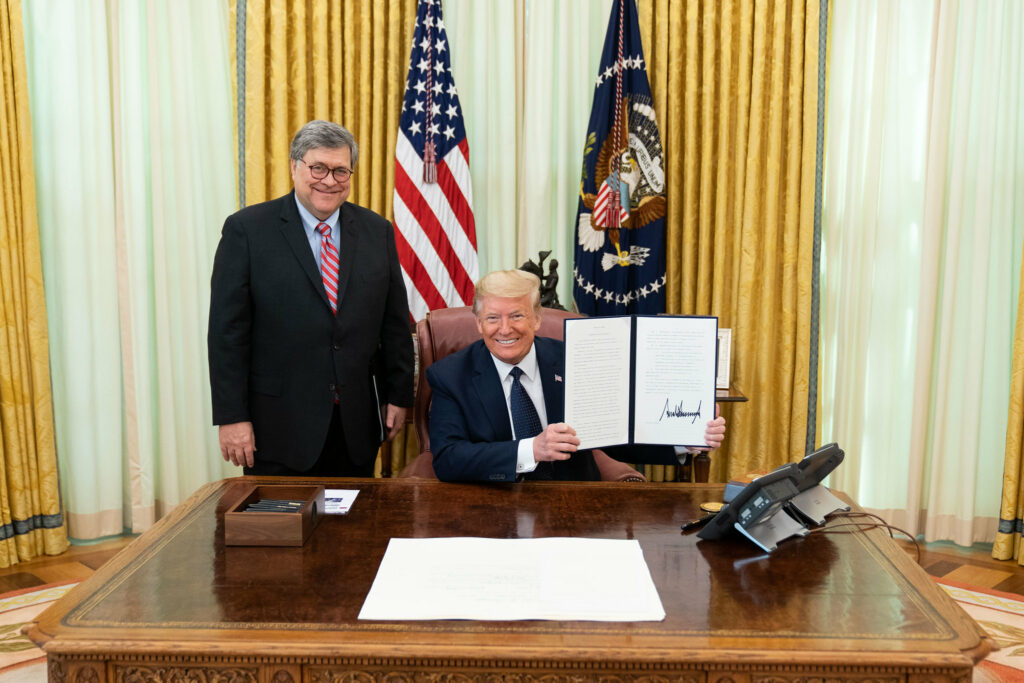$10M Cash Withdrawal Sparked Secret Trump-Egypt Investigation

In January 2017, just days before Donald Trump assumed the presidency, a bank manager in Cairo received an unusual request from an organization linked to Egyptian intelligence: withdraw nearly $10 million in cash. Employees at the National Bank of Egypt prepared the bundles of $100 bills, which four men later took away. This substantial transaction raised red flags among U.S. officials, leading to a secretive investigation by the Justice Department, as detailed by The Washington Post.
Federal investigators became aware of the withdrawal in early 2019, intensifying an existing criminal probe. This investigation began two years earlier, fueled by classified U.S. intelligence suggesting Egyptian President Abdel Fatah El-Sisi intended to financially support Trump’s 2016 campaign. The Justice Department examined whether this alleged transfer violated federal laws prohibiting U.S. candidates from receiving foreign funds. Investigators also sought to understand if this money influenced Trump’s decision to infuse his campaign with $10 million of his own money in the final days before the election.
Despite these efforts, crucial questions remained unanswered. Prosecutors and FBI agents were blocked from obtaining potentially key bank records by senior Justice Department officials, leading the case to stall by late 2019. Trump’s Attorney General at the time, William P. Barr, doubted there was sufficient evidence to continue. Barr directed U.S. Attorney Jessie Liu to review the classified intelligence personally, and later imposed oversight on the FBI agents involved, according to The Washington Post.
The case was formally closed in June 2020 by Michael Sherwin, who cited insufficient evidence to prove any wrongdoing. However, internal disagreements persisted about whether the investigation had been thorough enough.
Trump’s campaign spokesperson labeled the investigation as “textbook Fake News,” asserting that no wrongdoing was found and the case was closed. An Egyptian government spokesperson also emphasized that the Justice Department ended the investigation without pressing charges.
Throughout Trump’s presidency, U.S. policy shifts favoring Egypt drew scrutiny, especially given the ongoing investigation. For instance, in 2018, the Trump administration released military aid to Egypt that had been previously withheld over human rights concerns. Trump’s relationship with Sisi, whom he once called “my favorite dictator,” also raised questions.
The secretive investigation was based on reports from the CIA and a confidential informant. This led to the formation of “Team 10” within Special Counsel Robert Mueller’s office, named after the alleged $10 million from Egypt. The probe focused on whether funds were transferred from Egypt to Trump, scrutinizing transactions and Trump’s bank records.
Despite the investigation’s closure, its implications linger. The Justice Department, the FBI, and key figures like Barr and Liu have not provided detailed answers, leaving many aspects of the probe shrouded in mystery.
Background and Analysis
This account is drawn from thousands of government records and interviews with more than two dozen individuals familiar with the investigation. The probe began in early 2017 and remained secretive throughout its duration. Public attention briefly surfaced during a closed court hearing involving a state-owned foreign corporation, later identified as an Egyptian bank.
CNN reported in 2020 that Mueller’s team proposed subpoenaing Trump’s financial records, but top officials concluded the case was at a dead-end. Investigators had traced a $9,998,000 cash withdrawal in Cairo, nearly matching the amount Trump infused into his campaign. This discovery, along with other financial transactions, led them to hypothesize that Trump expected reimbursement from Sisi.
The investigation faced significant internal and external challenges. Barr’s oversight and Liu’s hesitancy to subpoena additional bank records were pivotal in steering the probe to its conclusion. Barr’s skepticism about the agents’ motives, combined with Liu’s concerns about appearing to interfere in a presidential campaign, ultimately halted further investigative efforts.
On Jan. 15, 2022, five years after the cash withdrawal in Cairo, the federal statute of limitations for illegal campaign contributions lapsed. This expiration means the lingering questions from the Trump-Egypt investigation may remain unanswered.
Closing Thoughts
The investigation into whether Trump received financial support from Egypt highlights the complexities and political sensitivities surrounding such probes. It underscores the challenges faced by investigators in pursuing cases involving high-profile figures and potential foreign interference. While the case was closed, its unresolved questions continue to fuel discussions about the intersections of politics, law, and international relations.

